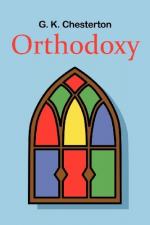
|
| Name: _________________________ | Period: ___________________ |
This test consists of 5 multiple choice questions, 5 short answer questions, and 10 short essay questions.
Multiple Choice Questions
1. Why, in the abstract, does Chesterton disapprove of long, complicated words?
(a) Few people know what they mean.
(b) They hinder understanding.
(c) They do not require thinking.
(d) They are difficult to read and pronounce.
2. What is Pimlico?
(a) Chesterton's favorite dog.
(b) An English newspaper.
(c) A dreary English town.
(d) A dreary American town.
3. How has western religion interacted with the idea of social organisms?
(a) Western religion says that social organisms are harmful to faith.
(b) Western religion says that the church provides the only stable society.
(c) Western religion says that no person should be alone.
(d) Western religion says that the family unit is the only important social organism.
4. Why does Chesterton say that any discussion about the creation/sustaining principle in the world must be metaphorical?
(a) Because it is necessarily verbal.
(b) Because it relates to God.
(c) Because man can never prove the principle.
(d) Because man cannot truly understand creation.
5. In Chesterton's image, how did he feel once his religious opinion changed? (Chesterton 2000, pg. 235)
(a) The army had fled before the light of his revelation.
(b) The dragon had been conquered.
(c) The land was lit up even back to his childhood.
(d) Fairyland was no longer important to his thinking.
Short Answer Questions
1. According to Chesterton, how did men gain morality?
2. Chesterton chooses miracles as his first example regarding liberal thinking. What does he call this example?
3. Why did the writings of skeptics and evolutionists push Chesterton toward Christianity?
4. Why does Chesterton say that miracles are eminently desirable?
5. How do St. Francis of Assisi and George Herbert think of Nature?
Short Essay Questions
1. What is the common view of Christianity and Buddhism, according to Chesterton? How are they similar and dissimilar? What is Chesterton's opinion of their differences?
2. How does Chesterton explain the modern view of miracles? Is this view contradictory?
3. What nearly persuaded Chesterton to become a Christian? Why was this thought frightening?
4. In Chapter VI, The Paradoxes of Christianity, what does Chesterton name the most common type of trouble in the world? How does Christianity answer this trouble?
5. As Chesterton argues, why does love seek individuality and personality? Is this true only in relation to man or also in relation to God?
6. How do Eastern and Western religions differ in their understanding of seclusion in worship, according to Chesterton? How does this affect their sense of community?
7. Chesterton says that the primary evil with the pessimist is that he does not love what he chastises. How is this true?
8. If Nature does improve man through impersonal means, as Chesterton claims, what must happen? What is happening in reality?
9. Why, according to Chesterton, do modern thinkers find it advantageous to modernity to change the vision of heaven constantly? What effect does this have on man's mind?
10. The Church holds to some strict doctrines regarding man and his actions. Why is she so strict? Is it possible for her to swerve in her beliefs?
|
This section contains 1,698 words (approx. 6 pages at 300 words per page) |

|




